| Listing 1 - 10 of 10 |
Sort by
|
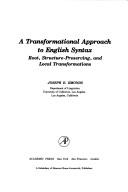
ISBN: 0122385500 Year: 1976 Publisher: New York Academic Press
Abstract | Keywords | Export | Availability | Bookmark
 Loading...
Loading...Choose an application
- Reference Manager
- EndNote
- RefWorks (Direct export to RefWorks)
English language --- Generative grammar. --- Grammar, Comparative and general --- Grammar, Generative. --- Syntax. --- -Grammar, Generative --- -English language --- -Generative grammar --- -Comparative grammar --- Grammar --- Grammar, Philosophical --- Grammar, Universal --- Language and languages --- Philosophical grammar --- Grammar, Generative --- Grammar, Transformational --- Grammar, Transformational generative --- Transformational generative grammar --- Transformational grammar --- Syntax --- Grammar, Comparative --- Derivation --- Generative grammar --- Psycholinguistics --- Anglais (Langue) --- Grammaire générative --- Syntaxe --- Linguistics --- Philology --- Germanic languages --- Grammar, Comparative and general Syntax

ISBN: 3110169819 3110166895 3110872994 9783110872996 9783110169812 9783110166897 Year: 2000 Volume: 50 Publisher: Berlin Mouton de Gruyter
Abstract | Keywords | Export | Availability | Bookmark
 Loading...
Loading...Choose an application
- Reference Manager
- EndNote
- RefWorks (Direct export to RefWorks)
No detailed description available for "Lexicon and Grammar".
English language --- -English language --- -Germanic languages --- Grammar, Generative --- Syntax --- -Grammar, Generative --- Syntax. --- Grammar, Generative. --- Generative grammar --- Germanic languages
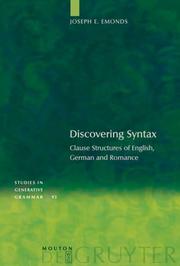
ISBN: 128219688X 9786612196881 3110207524 9783110207521 9781282196889 9783110186826 3110186829 6612196882 Year: 2008 Publisher: Berlin Boston
Abstract | Keywords | Export | Availability | Bookmark
 Loading...
Loading...Choose an application
- Reference Manager
- EndNote
- RefWorks (Direct export to RefWorks)
The essays in this volume, dating from 1991 onwards, focus on highly characteristic constructions of English, Romance languages, and German. Among clause-internal structures, the most puzzling are English double objects, particle constructions, and non-finite complementation (infinitives, participles and gerunds). Separate chapters in Part I offer relatively complete analyses of each. These analyses are integrated into the framework of Emonds (2000), wherein a simplified subcategorization theory fully expresses complement selection. Principal results of that framework constitute the initial essay of Part I. areas. The self-contained essays can all be read separately. They are rich in empirical documentation, and yet in all of them, solutions are constructed around a coherent, relatively simple theoretical core. In Romance languages, classic generative debates have singled out clitic and causative constructions as the most challenging. Separate essays in Part II lay out the often complex paradigms and propose detailed syntactic solutions, simple in their overall architecture yet rich in detailed predictions. Concerning movements to clausal edges, especially controversial topics include passives, English parasitic gaps, and the nature of verb-second systems exemplified by German.. The essays in Part III each use rather surprising but still theoretically constrained structural accounts to solve thorny problems in all three.
Languages, Modern --- Syntax. --- English/language. --- German/language. --- Romance languages. --- generative syntax.
Book
Year: 1970 Publisher: Bloomington (Ind.) : Indiana University. Linguistics club,
Abstract | Keywords | Export | Availability | Bookmark
 Loading...
Loading...Choose an application
- Reference Manager
- EndNote
- RefWorks (Direct export to RefWorks)
Book
Year: 1971 Publisher: Bloomington (Ind.) : Indiana University. Linguistics club,
Abstract | Keywords | Export | Availability | Bookmark
 Loading...
Loading...Choose an application
- Reference Manager
- EndNote
- RefWorks (Direct export to RefWorks)
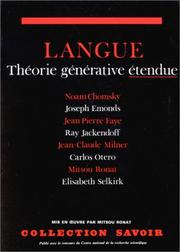
ISBN: 2705658394 9782705658397 Year: 1977 Publisher: Paris : Hermann,
Abstract | Keywords | Export | Availability | Bookmark
 Loading...
Loading...Choose an application
- Reference Manager
- EndNote
- RefWorks (Direct export to RefWorks)
Grammar --- Generative grammar --- Grammaire générative --- Generative grammar. --- Grammar, Comparative and general --- Grammar, Generative --- Grammar, Transformational --- Grammar, Transformational generative --- Transformational generative grammar --- Transformational grammar --- Psycholinguistics --- Derivation --- Grammaire générative --- Grammaire générative.
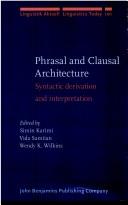
ISBN: 9789027233653 9027233659 9786612155048 1282155040 9027292922 9789027292926 9781282155046 Year: 2007 Volume: 101 101 Publisher: Amsterdam Benjamins
Abstract | Keywords | Export | Availability | Bookmark
 Loading...
Loading...Choose an application
- Reference Manager
- EndNote
- RefWorks (Direct export to RefWorks)
In this paper, I discuss "quasi-argument" thematic roles (Instrument, Benefactive and certain Locations), and argue on the basis of their reconstruction properties and their dependence on event-related features that we should analyze them as generated in the event-related functional projections for VP, rather than in VP itself. This supports an approach to thematic roles as defined relative to syntactic relations, since I argue that the roles in question are not definable in relation to lexically specified verbal predicates.
Grammar, Comparative and general --- Syntax. --- Grammar --- Language and languages --- Syntax --- Linguistics --- Philology --- Linguistics. --- Linguistic science --- Science of language --- Grammar, Comparative and general - Syntax. --- Grammar, Comparative and general Syntax
Book
ISBN: 9788024451725 9788024451732 Year: 2017 Publisher: Olomouc : Palacký University,
Abstract | Keywords | Export | Availability | Bookmark
 Loading...
Loading...Choose an application
- Reference Manager
- EndNote
- RefWorks (Direct export to RefWorks)
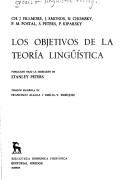
ISBN: 8424909038 8424909046 9788424909031 9788424909048 Year: 1983 Volume: 330 Publisher: Madrid Gredos
Abstract | Keywords | Export | Availability | Bookmark
 Loading...
Loading...Choose an application
- Reference Manager
- EndNote
- RefWorks (Direct export to RefWorks)
800 --- Taalwetenschap. Taalkunde. Linguistiek --- Linguistics --- Linguistique --- Linguistics. --- Taalwetenschap. --- Theorieën. --- 800 Taalwetenschap. Taalkunde. Linguistiek
Book
ISBN: 9788024440606 8024440601 9788024440590 8024440598 Year: 2014 Publisher: Olomouc : Palacky University,
Abstract | Keywords | Export | Availability | Bookmark
 Loading...
Loading...Choose an application
- Reference Manager
- EndNote
- RefWorks (Direct export to RefWorks)
| Listing 1 - 10 of 10 |
Sort by
|

 Search
Search Feedback
Feedback About UniCat
About UniCat  Help
Help News
News